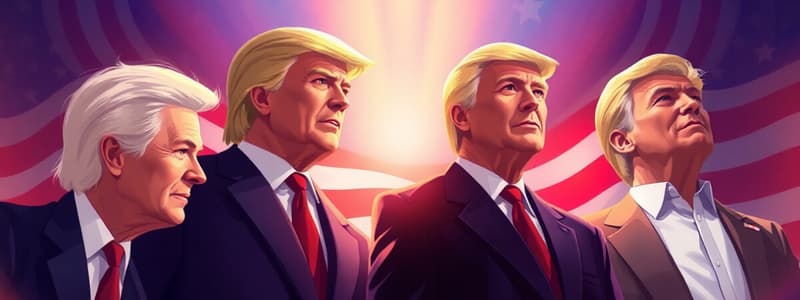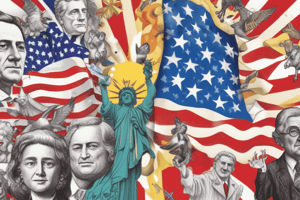Podcast
Questions and Answers
What is the primary purpose of political parties?
What is the primary purpose of political parties?
In what way do political parties differ from interest groups?
In what way do political parties differ from interest groups?
What role do party platforms play in Congress?
What role do party platforms play in Congress?
How did James Madison perceive the formation of factions in society?
How did James Madison perceive the formation of factions in society?
What additional function do political parties serve beyond nominating candidates?
What additional function do political parties serve beyond nominating candidates?
What system was used to elect the president and vice president prior to the Twelfth Amendment?
What system was used to elect the president and vice president prior to the Twelfth Amendment?
What political parties emerged from the division of the Democratic-Republicans?
What political parties emerged from the division of the Democratic-Republicans?
What was a significant outcome of the election of 1824 regarding Andrew Jackson?
What was a significant outcome of the election of 1824 regarding Andrew Jackson?
What was the main strategy used by the Democratic Party to maintain power during its dominance?
What was the main strategy used by the Democratic Party to maintain power during its dominance?
What did the Twelfth Amendment change about the presidential election process?
What did the Twelfth Amendment change about the presidential election process?
Which party emerged in 1860 in response to the growing tensions over slavery?
Which party emerged in 1860 in response to the growing tensions over slavery?
What was the primary focus of the Democratic Party formed from the Democratic-Republicans?
What was the primary focus of the Democratic Party formed from the Democratic-Republicans?
What was one of the key issues the Populist Party advocated for?
What was one of the key issues the Populist Party advocated for?
What is the main function of political parties in the United States?
What is the main function of political parties in the United States?
What was one of the reforms proposed by the Progressive Party in 1912?
What was one of the reforms proposed by the Progressive Party in 1912?
Which statement accurately describes the fate of the Progressive Party after 1916?
Which statement accurately describes the fate of the Progressive Party after 1916?
Which of the following statements is true regarding the origins of U.S. political parties?
Which of the following statements is true regarding the origins of U.S. political parties?
What does a party platform represent?
What does a party platform represent?
According to the content, what risk does a political party face if it takes too narrow a position on issues?
According to the content, what risk does a political party face if it takes too narrow a position on issues?
What does the term 'electoral coalition' refer to in the context of political parties?
What does the term 'electoral coalition' refer to in the context of political parties?
What is one potential outcome of implementing proportional representation in elections?
What is one potential outcome of implementing proportional representation in elections?
Which of the following is a reason the U.S. has a two-party system?
Which of the following is a reason the U.S. has a two-party system?
What is a characteristic of the Electoral College system in the U.S.?
What is a characteristic of the Electoral College system in the U.S.?
Which factor does NOT contribute to the difficulty of forming third parties in the U.S.?
Which factor does NOT contribute to the difficulty of forming third parties in the U.S.?
What do most U.S. voters identify as, which influences party competition?
What do most U.S. voters identify as, which influences party competition?
What was a primary reason the Dixiecrats split from the Democratic Party?
What was a primary reason the Dixiecrats split from the Democratic Party?
What electoral system contributes significantly to the existence of a two-party system in the United States?
What electoral system contributes significantly to the existence of a two-party system in the United States?
Which group is primarily associated with the opposition to federal intervention in issues of segregation and civil rights?
Which group is primarily associated with the opposition to federal intervention in issues of segregation and civil rights?
What change in demographic preferences has been noted among the Millennials compared to older generations?
What change in demographic preferences has been noted among the Millennials compared to older generations?
Why might voters view congressional elections differently than presidential elections?
Why might voters view congressional elections differently than presidential elections?
Which of the following is a common fate for third parties in the United States?
Which of the following is a common fate for third parties in the United States?
What effect do winner-take-all elections have on potential candidates?
What effect do winner-take-all elections have on potential candidates?
What is a key factor that can lead to party realignment?
What is a key factor that can lead to party realignment?
What was one outcome of the Democrats including African Americans in their coalition during the Great Depression?
What was one outcome of the Democrats including African Americans in their coalition during the Great Depression?
Which era is identified as the Sixth Party System in U.S. political history?
Which era is identified as the Sixth Party System in U.S. political history?
What is the primary characteristic of plurality voting?
What is the primary characteristic of plurality voting?
What is one major drawback of plurality voting for third parties?
What is one major drawback of plurality voting for third parties?
How does a majoritarian voting scheme differ from plurality voting?
How does a majoritarian voting scheme differ from plurality voting?
What is a potential benefit of switching to a proportional electoral system?
What is a potential benefit of switching to a proportional electoral system?
What factor contributes to the challenges faced by third-party candidates in U.S. elections?
What factor contributes to the challenges faced by third-party candidates in U.S. elections?
Flashcards
What are political parties?
What are political parties?
Organizations that aim to influence government policy by gaining control through elections. They shape policy by proposing legislation, nominating candidates, and organizing campaigns.
Differentiate between interest groups and political parties.
Differentiate between interest groups and political parties.
Organized groups that advocate for specific policies without direct involvement in elections. They focus on influencing government, not holding office.
How did U.S. political parties form?
How did U.S. political parties form?
Political parties formed in the early years of the US as a result of differing views on federal power and economic policy. The two main parties - Federalists and Democratic-Republicans - emerged from debates surrounding the Constitution.
What is a collective action problem?
What is a collective action problem?
Signup and view all the flashcards
What are factions?
What are factions?
Signup and view all the flashcards
What are interest groups?
What are interest groups?
Signup and view all the flashcards
What is a party platform?
What is a party platform?
Signup and view all the flashcards
What were the differences between Federalists and Anti-Federalists?
What were the differences between Federalists and Anti-Federalists?
Signup and view all the flashcards
What did George Washington say about political?parties?
What did George Washington say about political?parties?
Signup and view all the flashcards
First Party System
First Party System
Signup and view all the flashcards
Twelfth Amendment
Twelfth Amendment
Signup and view all the flashcards
Corrupt Bargain
Corrupt Bargain
Signup and view all the flashcards
Second Party System
Second Party System
Signup and view all the flashcards
First Modern Political Party
First Modern Political Party
Signup and view all the flashcards
Spoils System
Spoils System
Signup and view all the flashcards
What are political machines?
What are political machines?
Signup and view all the flashcards
What are Third Parties?
What are Third Parties?
Signup and view all the flashcards
What was the Progressive Party?
What was the Progressive Party?
Signup and view all the flashcards
What was the Populist Party?
What was the Populist Party?
Signup and view all the flashcards
Plurality Voting
Plurality Voting
Signup and view all the flashcards
Majority Voting
Majority Voting
Signup and view all the flashcards
Proportional Representation
Proportional Representation
Signup and view all the flashcards
Two-Party System
Two-Party System
Signup and view all the flashcards
Winner-Take-All Elections
Winner-Take-All Elections
Signup and view all the flashcards
Majoritarian Voting
Majoritarian Voting
Signup and view all the flashcards
Spoiler Effect
Spoiler Effect
Signup and view all the flashcards
Party List System
Party List System
Signup and view all the flashcards
Evolving Electorate
Evolving Electorate
Signup and view all the flashcards
Population Shifts and Electoral Outcomes
Population Shifts and Electoral Outcomes
Signup and view all the flashcards
Regional Economic Changes
Regional Economic Changes
Signup and view all the flashcards
Local vs. National Priorities
Local vs. National Priorities
Signup and view all the flashcards
Party Adaptability
Party Adaptability
Signup and view all the flashcards
Winner-take-all system
Winner-take-all system
Signup and view all the flashcards
What is the Electoral College?
What is the Electoral College?
Signup and view all the flashcards
Third-party challenges
Third-party challenges
Signup and view all the flashcards
Realignment
Realignment
Signup and view all the flashcards




